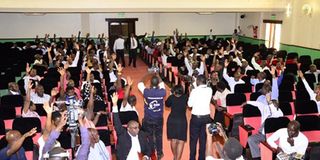Why you need to join an association

Lobbying. Makerere University lecturers vote to suspend one of their strikes recently. Most of the lecturers are members of Makerere University Academic Staff Association. PHOTO BY ALEX ESAGALA
What you need to know:
- According to Ruth Senyonyi, students also need to join associations because they help them understand their career aspirations as well as positioning themselves for opportunities.
- Francis Gimara, the president of USL, says no lawyer can be allowed to represent a client in court if they are not registered.
You have perhaps been trapped in a situation at your job before but with no one to run to.
Life can be deceptive. You get convinced that you do not need to belong to an association. Indeed you might never need it at all but you never know when and where you will seek help in case of a problem.
Associations are nonprofit in nature and only seek to fight for the rights and interests of their members as well as fostering professionalism and standards.
Brian Senoga is a businessman and a freelance writer; however, he is a member of the Human Resource Managers Association of Uganda, a loose association that brings together students, practicing professionals and retirees in the field of human resource management.
“The association was formed to provide consultancy and advice on human resources management through enforcing standards, enhancing development and promotion of professionalism,” he says. Every association has a code of conduct that members must adhere to and any breach calls for a reprimand.
According to Ruth Senyonyi, the first president of the Uganda Counsellors’ Association, no one forces cousellors to join the association but they have an obligation to monitor the activities of counsellors across the country.
Apart from fostering standards and professionalism, such associations according to Pheona Wall Nabasa, a former public relations director of Public Relations Association of Uganda, are avenues through which people network and explore opportunities.
Some associations such as Uganda Law Society (USL) go as far as locking out professionals from practice if they are not registered members.
For instance, Francis Gimara, the president of USL, says no lawyer can be allowed to represent a client in court if they are not registered.
“Every practicing lawyer must be registered and members must follow a defined code of conduct,” he says.
Some associations acts as a clearing house that endorse members for contracts or jobs after due consideration in regard to conduct and professionalism.
For instance, Gimara says, ULS has been at the centre stage of weeding out unethical individuals from practicing law.
Beyond ensuring professional conduct, such associations offer training opportunities to members.
“Associations help to enrich professional practice as well as planning for industrial changes,” says Gimara.
They also provide hands-on advice in cases where educational programmes need upgrading.
Important to students
Understanding career
According to Ruth Senyonyi, students also need to join associations because they help them understand their career aspirations as well as positioning themselves for opportunities.
Associations can also be used to advocate or lobby through collective bargain.
For instance, government prosecutors, through the Association of Prosecutors, recently went on strike demanding for better pay.
Already the association has been able to push through some concessions as well pressing for more.
Joining an association depends on a number of things but the key requirement is you must be a professional in that field or a practitioner.
Other requirements, according to Pheona Wall Nabasa, a former public relations director of Public Relations Association of Uganda, range from registration fees and annual contributions, among others. Such fees vary from one association to the other.




